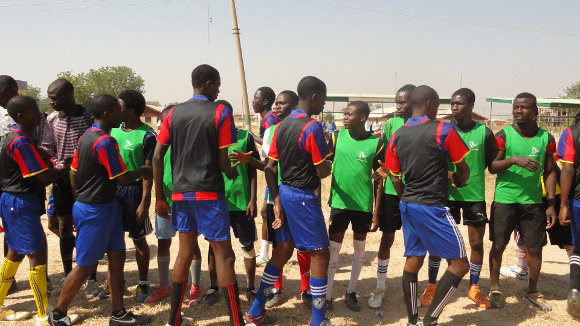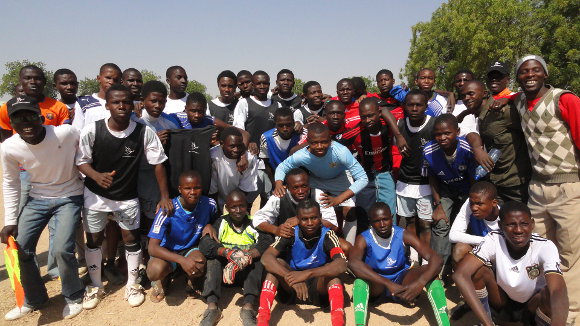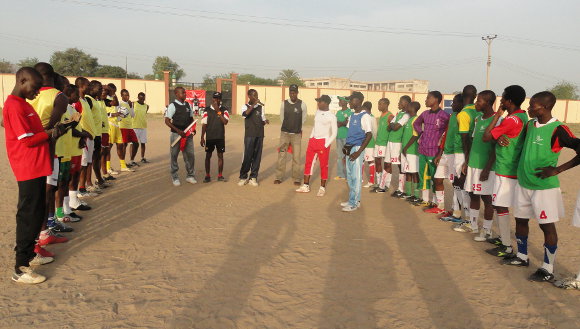
In recent times conflicts have arisen in several cities, most recently the bombings across the Northern states of Borno, Yobe, Kano, Kaduna, Plateau, Niger, Bauchi, and Abuja, which prompted President Goodluck Jonathan to declare a state of emergency in Adamawa, Borno, and Yobe States in May 2013. Members of different communities live in fear of conflicts, leading to violence, loss of lives and properties. Many Nigerians have come to question whether the country is on the brink of a civil war.
How can sport bring Nigerians together?
The definition of sport usually includes a broad and inclusive spectrum of activities suitable to people of all ages and abilities. By its very nature, sport is about participation, inclusion and citizenship. Sport has a unique power to attract, mobilize and inspire. Its intrinsic values - teamwork, fairness, discipline, respect for the opponent and the rules of the game - can be harnessed in the advancement of solidarity, social cohesion and peaceful coexistence. Sport as a universal language is a powerful tool to promote peace, tolerance and understanding by bringing people together across boundaries, cultures and religions.

The power of sport as a tool for conflict prevention and peacebuilding is reflected in a range of international agreements, strategies and instruments. In 1993, the United Nations restored the ancient tradition of the Olympic Truce, under which athletes from warring nations are granted safe passage to participate in the Olympic Games. Since then, prior to every Olympics, the United Nations General Assembly through a symbolic resolution entitled: Building a Peaceful and Better World through Sport and the Olympic Ideal. More recently, the Olympic Truce now includes the participants in the Paralympics Games also. The truce begins seven days before the start of each Olympic/Paralympics Games and continues until seven days after the closing ceremony, reminding the world that sport offers an opportunity to bridge even the bitterest socio-cultural divides.
Over 45,000 children and youth have been reached since the programme inception in 2008. The life skills learned through the sport programme for children and youth empowers young people in local communities in Nigeria and enhance their psychosocial well-being, resilience, self- esteem and connections with others.

One thing that unites most Nigerians is our passion for football, and an example of a sports peacebuilding initiative is our annual football tournament for local youth football clubs and high schools in Kano to help address deep-rooted prejudice and stereotypes that have contributed to violence in northern Nigeria, where we bring together local football teams from Kano’s eight metropolitan local government areas every year. Kano has suffered from political violence and bombings in recent years, with young people vulnerable to being drawn into violence. The project targets young people to promote tolerance, inclusion, leadership skills, and to share ideas on income generating activities that would empower participants.
Sports are just a starting point. The young people also independently plan intercultural activities within communities such as town hall meetings - interfaith dialogues in which parents, community leaders, and religious groups participate. Sports programmes make it easy to hold dialogue forums with young people as well as other community members. The attention is not focused only on the physical benefits of sports but also on building relationships and creating opportunity for healing and dialogue to eradicate the root cause of the conflict. The programme provides a platform for encouraging peaceful encounters, social contract, building friendships, providing a shared sense of identity, and belonging.
This is the best program I have ever attended; using sport to preach peace. This kind of programme should be a continuous thing, as long as we want peace to reign in our community. I wish this event will be sustained. - Buhari Rabiu, 17This work is not easy. Even finding a suitable location for participants is a major challenge because of the deteriorating security situation in northern Nigeria, as we of course have to consider the safety of young people amidst the increased activities of armed groups in Northern Nigeria. But our programme is an example of how sport can promote healing and peace.
Sport is not a cure-all for development problems. If a programme is badly designed, it can bring out the negative sides of sport - violence, corruption and discrimination. To enable sport to unleash its full positive potential, emphasis must be place on incorporating the best values of sport and peacebuilding principles such as: acceptance, cooperation, inclusion, responsibility, respect and, trust. When integrated properly with other community programmes and services, sport initiatives can connect participants to resources that can help them in creating employment opportunities.









